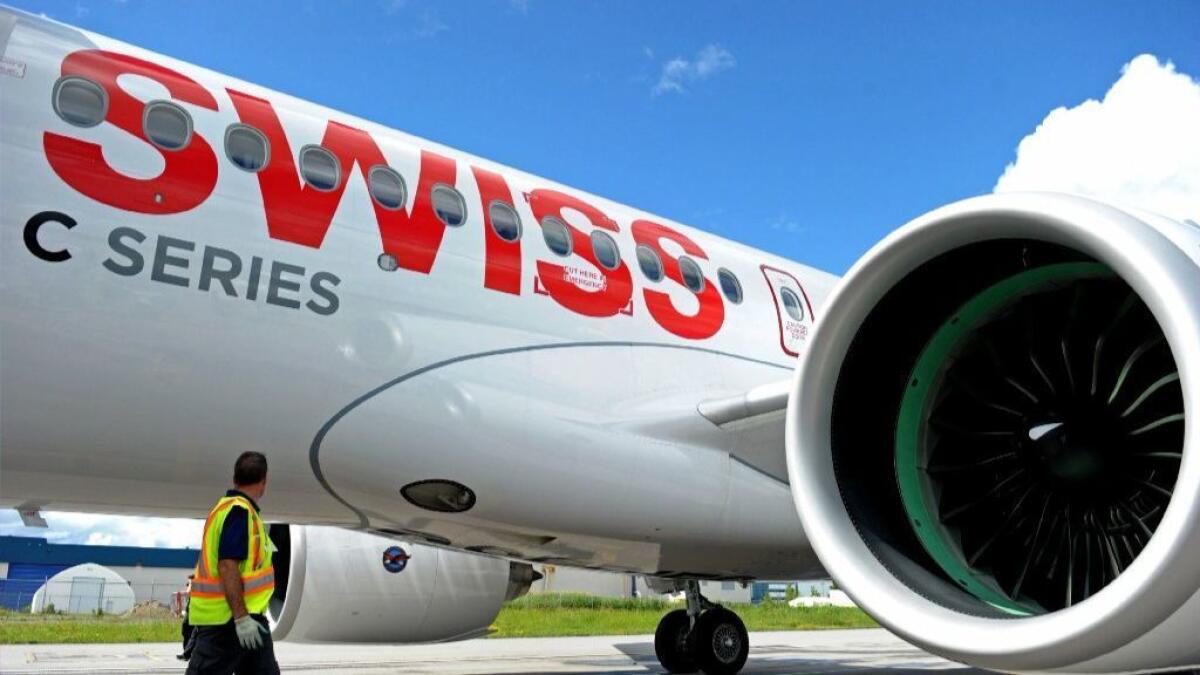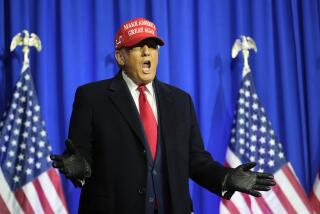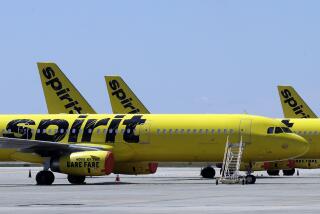U.S. trade commission rejects Trump administration’s bid to impose tariffs on Canadian jets

U S. trade officials Friday rejected a complaint by Boeing Co. that it was harmed by the alleged dumping of regional jets made by Canadian rival Bombardier — a surprising conclusion to a trade dispute that has stirred up rancor between the two nations and threatened to aggravate efforts to renegotiate the North American Free Trade Agreement
The 4-0 decision by the independent U.S. International Trade Commission is a blow to the Trump administration. The Commerce Department had recommended slapping tariffs of almost 300% on Bombardier. Commerce officials last year agreed with Chicago-based Boeing’s allegations that the government-subsidized Canadian aircraft manufacturer had sold its C-series airplanes to Delta Air Lines at a price below the cost of production.
Under U.S. law, a finding of injury or threat of injury is required for the Commerce-proposed tariffs to take effect. Bombardier had argued that Boeing did not suffer harm because it does not compete with the kind of C series 100- to 150-seat planes it sold to Delta. And Delta had said Boeing was not in consideration for the business that Bombardier won because Boeing did not offer new competing products.
The decision comes just days after President Trump slapped big tariffs on imported solar panels and washing machines, in what some analysts regarded as possibly the beginning of the tough hand in trade that Trump has been promising for months.
Trump has tended to wrap his trade politics in a way to placate critics and those in his party worried that he is leading the country down a dangerous path of nationalism. The commission’s decision Friday shows some of the constraints that even the president faces. The International Trade Commission is an independent quasi-judicial federal agency made up of members of both parties.
There was no immediate comment from the Trump administration on the ruling, although the issue has been a sore point between the two close allies and drew others into the dispute, including British Prime Minister Theresa May. She met Trump on the sidelines of the World Economic Forum in Davos, Switzerland, to lobby on behalf of Bombardier, a Montreal-based company that makes its wings in Northern Ireland.
Boeing expressed disappointment with the vote, saying that “we are feeling the effects of those unfair business practices in the market every day.”
Bombardier called the decision “a victory for innovation, competition and the rule of law.”
The trade commission’s decision could help ease tensions between the U.S. and Canada as the two nations have also sparred over Canadian exports of lumber and newsprint.
In anticipation of tariffs on the Bombardier planes, the Canadian government had scrapped a plan to buy 18 military fighter jets from Boeing, opting instead to purchase 18 used F-18 fighters from Australia. Canadian officials also had mentioned the possibility of resisting any tariffs on Bombardier by protesting to the World Trade Organization or contesting the tariffs through a dispute-resolution mechanism under the North American Free Trade Agreement — a mechanism that Trump’s top trade official, Robert Lighthizer, is trying to discard in revamping NAFTA.
Chrystia Freeland, Canada’s minister of foreign affairs, said “we are very pleased” by the commission’s vote and that the Canadian government “will always vigorously defend the Canadian aerospace industry and its workers against protectionist trade practices.”
The sixth round of NAFTA renegotiation talks are underway this week in Montreal. Trump said earlier in the week that the talks were proceeding “pretty well,” although he has continued to hold out the threat of a withdrawal from the 24-year-old pact that binds the U.S., Canada and Mexico.
In a speech Friday to global political and business leaders in Switzerland, Trump did not talk like someone who wanted a trade war, saying that the U.S. economy was open for business and that his “America First” policy “does not mean America alone.” The president stated, however, as he did at the United Nations last fall, that leaders of all nations should put their own country’s interests first.
Trump’s tough rhetoric on trade has emboldened companies to file complaints with the U.S., although Scott Paul of the Alliance for American Manufacturing said that Boeing, Whirlpool and solar panel makers probably would have done so under any administration — and found similar outcomes.
What’s new under Trump is that his administration has moved to revamp NAFTA and the U.S. trade pact with South Korea, and has opened up trade investigations without anyone bringing a formal complaint to the government.
While the tariffs imposed earlier this week on imported Chinese solar panels and washers from South Korea drew attention — as well as criticism from trading partners — Trump has yet to announce decisions on some critical cases involving China that his officials initiated. In those matters, the president does not need anyone’s approval to impose tariffs and other sanctions.
In the coming weeks, Trump is expected to reveal how severely he intends to punish China for allegedly stealing intellectual property and dumping steel and other exports.
“What he does on China — that will be the test,” said William Reinsch, a trade expert and senior advisor at the Center for Strategic and International Studies in Washington. “I think he’s going to hit them pretty hard,” he said, adding that Trump might slap sweeping tariffs or expanded restrictions on Chinese investments in the U.S.
Many trade analysts agree that China has persisted in engaging in mercantilist behavior and that the global economy and current trading system have been painful for some Americans even as they have benefited from cheap foreign goods. But many of the same experts fear Trump’s actions will lead to a tit-for-tat escalation of trade conflicts, particularly with China, that will prove costly to American consumers, importers and the economy.
Trump and his top trade officials are betting that China and other countries will decide that they cannot afford not to do business with the United States, and will absorb new tariffs or change their behavior in response to them. One possible outcome that Trump has sought is for more foreign firms to open plants in the United States, just as Japanese automakers did starting in the 1980s as a way to defuse American political pressures.
And there are signs that is starting to happen. While the Trump administration was pursuing a complaint against imported washing machines brought by Whirlpool last year, both Samsung and LG, the two South Korean firms that will feel the brunt of the new tariffs, undertook moves to manufacture washers in the United States. Samsung said this week that its washer assembly plant in South Carolina had opened this month with more than 600 workers.
Bombardier also is following a similar playbook. The Canadian company has said it is planning a partnership with Airbus, Boeing’s principal rival, to open a plant in Alabama for final assembly of smaller jets — the kinds of aircraft that, until Friday, were facing the prospect of crippling tariffs.
Boeing, meanwhile, is attempting to buy the Brazilian aircraft maker Embraer, which makes planes that compete with Bombardier.
Follow me at @dleelatimes
UPDATES:
2:25 p.m.: This article was updated with reaction from Bombardier, Boeing and trade experts and additional analysis.
This article was originally published at 1:50 p.m.







